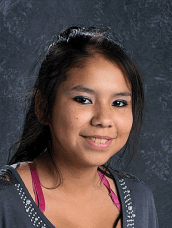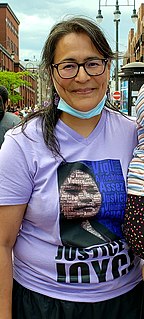Related Research Articles

The Highway of Tears is a 725-kilometre (450 mi) corridor of Highway 16 between Prince George and Prince Rupert, British Columbia, Canada, which has been the location of many missing and murdered Indigenous women (MMIW) beginning in 1970. The phrase was coined during a vigil held in Terrace, British Columbia in 1998, by Florence Naziel, who was thinking of the victims' families crying over their loved ones. There is a disproportionately high number of Indigenous women on the list of victims.
The Native Women's Association of Canada is a national Indigenous organization representing the political voice of Indigenous women, girls, and gender-diverse people in Canada, inclusive of First Nations on and off reserve, status and non-status, disenfranchised, Métis, and Inuit. An aggregate of Indigenous women's organizations from across the country, NWAC was founded on the collective goal to enhance, promote, and foster the social, economic, cultural and political well-being of Indigenous women within their respective communities and Canadian societies.
Connie Walker is a Cree journalist.
Katherena Vermette is a Canadian writer, who won the Governor General's Award for English-language poetry in 2013 for her collection North End Love Songs. Vermette is of Métis descent and originates from Winnipeg, Manitoba. She was a MFA student in creative writing at the University of British Columbia.
Elle-Máijá Apiniskim Tailfeathers is a Blackfoot and Sámi filmmaker, actor, producer and curatorial assistant from the Kainai First Nation. She has won several accolades for her film work.

The Missing and Murdered Indigenous Women (MMIW) human-rights crisis disproportionately affects Indigenous peoples in Canada and the United States, notably those in the FNMI and Native American communities. A corresponding mass movement in the US and Canada works to raise awareness of missing and murdered Indigenous women and girls (MMIWG) through organized marches; the building of databases; local community, city council, and tribal council meetings; and domestic violence trainings for police.

Tina Michelle Fontaine was a First Nations teenage girl who was reported missing and died in August 2014. Her case is considered among the high number of missing and murdered Indigenous women of Canada, and her death renewed calls by activists for the government to conduct a national inquiry into the issue.

Michèle Taïna Audette is a Canadian politician and Native Canadian activist. She has served as president of Femmes autochtones du Québec and the Native Women's Association of Canada. She served from 2004 through 2008 as Associate Deputy Minister at the Ministry of Relations with Citizens and Immigration of the Quebec government, where she was in charge of the Secretariat for Women. In 2017, she was appointed as one of the five commissioners of the government's national inquiry into missing and murdered Indigenous women and girls. In 2021, Prime Minister Justin Trudeau nominated her to the Canadian Senate, as a Senator for Quebec.
This River is a 2016 Canadian short documentary film directed by Katherena Vermette and Erika MacPherson. The film centres on Drag the Red, a volunteer group in Manitoba who search the Red River for the bodies of Missing and Murdered Indigenous Women.
Bernadette Smith is a Canadian First Nations politician who was elected to the Legislative Assembly of Manitoba in a by-election on June 13, 2017. She represents the electoral district of Point Douglas as a member of the Manitoba New Democratic Party.
Serena Chelsea "Serenity" McKay was an Indigenous woman from Manitoba, Canada, whose murder was video recorded and posted on social media—being streamed on Facebook Live, in particular. McKay preferred to go by the name "Serenity".
Vice Canada Reports is a Canadian web and television series, produced and distributed by Vice Media through the website of Vice Magazine in 2015 and 2016. The series consists of documentary news reports, which were distributed through the website until the launch of the Viceland television channel's Canadian version in 2016 formally known as "CANADIANA" and "Vice Canada".

The REDress Project by Jaime Black is a public art installation that was created in response to the missing and murdered Indigenous women (MMIW) epidemic in Canada and the United States. The on-going project began in 2010 and commemorates missing and murdered indigenous women from the First Nations, Inuit, Métis (FNIM), and Native American communities by hanging empty red dresses in a range of environments. The project has also inspired other artists to use red to draw attention to the issue of MMIW, and prompted the creation of Red Dress Day.
Ryan McMahon is an Anishinaabe comedian, podcaster and writer from the Couchiching First Nation. McMahon was born in Fort Frances, Ontario, the oldest of three siblings. McMahon was the first in his family to graduate from high school. He attended the University of Minnesota on a full hockey scholarship and graduated from the Second City Training Center.
Tanya Kappo is an indigenous rights activist. She is one of the co-founders of Idle No More and was briefly the manager of community relations for Canada's national public inquiry into missing and murdered Indigenous women and girls.

A red handprint, usually painted across the mouth, is a symbol that is used to indicate solidarity with missing and murdered Indigenous women and girls in North America, in recognition of the fact that Native American women are up to 10 times more likely to be murdered or sexually assaulted in some regions of the United States.
Throughout its history, the Canadian Indian residential school system saw many deaths. The number of school-related deaths, mostly from tuberculosis, remains unknown due to incomplete records. Estimates range from 3,200 to over 6,000. Comparatively few cemeteries associated with residential schools are explicitly referenced in surviving documents, however the age and duration of the schools suggests that most had a cemetery associated with them. Most cemeteries were unregistered, and as such the locations of many burial sites of residential school children have been lost. The Truth and Reconciliation Commission of Canada has called for "the ongoing identification, documentation, maintenance, commemoration, and protection of residential school cemeteries or other sites at which residential school children were buried."
Tammy Lynn Lamondin-Gagnon was an Ojibwe woman who disappeared in Newmarket, Ontario in 1999. As of 2022, Lamondin-Gagnon's whereabouts and the circumstances of her disappearance remain unknown.
Jaime Black is an Indigenous Canadian multidisciplinary artist-activist focused on First Nations and Indigenous representation and identity. She identifies as Métis, an ethnic group native to the three Prairie Provinces as well as parts of Ontario, British Columbia, and the Northwest Territories of Canada and the Northern United States, which traces descent to both Indigenous North Americans and Western European settlers. Black is best known for her art installation The REDress Project that she created as a response to the Missing and Murdered Indigenous Women (MMIW) crisis in Canada as well as the United States. A 2014 report by the Royal Canadian Mounted Police found that more than 1,000 Indigenous women were murdered over the span of 30 years from 1980 to 2012. However, some Indigenous advocacy groups dispute these reports arguing that the number is much greater than the government has acknowledged.
Marika Sila is an Inuvialuk actress, content creator, and social activist. Born in Yellowknife, Northwest Territories, Canada, her family moved to Canmore, Alberta when she was five years old. Olympic cross-country skiier Jesse Cockney is her older brother.
References
- ↑ Danton Unger (3 September 2021). "'We lost a huge champion': Community mourns death of MMIWG2S advocate, co-founder of Drag the Red". iHeartRadio. Retrieved 30 September 2021.
- ↑ Austin Grabish (17 June 2017). "Drag the Red searchers get grim lesson on finding, identifying bones". CBC News. Retrieved 30 September 2021.
- 1 2 "New 'one of a kind' boat will help Drag the Red continue search for missing in Winnipeg rivers". CBC News. 21 June 2021. Retrieved 30 September 2021.
- ↑ Leyland Cecco (9 June 2019). "Canadian volunteers scour river for missing Indigenous women". The Guardian. Retrieved 30 September 2021.
- ↑ Akeesha Footman (4 August 2016). "This River documentary searches for missing and murdered Indigenous women and girls". Muskrat Magazine. Retrieved 30 September 2021.